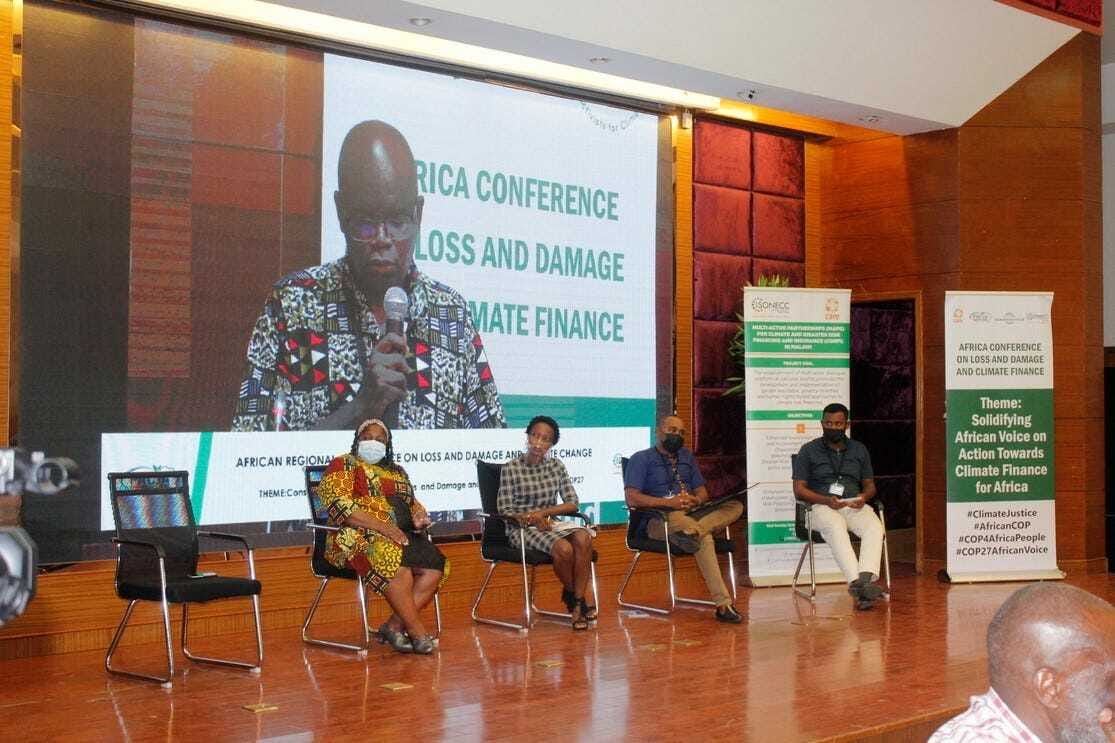
MALAWI: African civil society players were divided on a number of issues at a conference in Lilongwe, Malawi (from 25th – 29th April 2022), including mechanisms for compensating for climate-related disasters and the definition of loss and damage.
While some argued for the need for insurance to cover losses and damage caused by climate change, others argued that doing so would allow profiteers to maximize profits while leaving victims and survivors of floods and droughts out in the cold.
According to Yamikani Mlangiza of Malawi's Civil Society Network on Climate Change (CISONECC), climate and disaster risk financing and insurance can play an important role in financing for loss and damage.
However, Dr. Godwin Uyi Ojo, Executive Director of Environmental Rights Action/Friends of the Earth Nigeria (ERA/FoEN), stated that farmers are supposed to be compensated for losses and damage caused by floods caused by heavy rains and that this can only be done through a global financial mechanism established under the UN Framework Convention on Climate Change.
“Allowing market mechanism into this will perpetuate the injustices the poor rural farmers have endured,” said Dr Ojo who added that Africa must not promote solutions that comfort the big polluters to the detriment of those vulnerable such as climate insurance disregarding adaptation among others.
According to Obed Koringo of Care International, the level of pay-out in the insurance sector is so high that farmers are never compensated.
“The farmers don’t have an understanding of insurance and threshold makes it easy for them to do an insurance policy that doesn’t benefit them. The data used for the insurance is sometimes too general and doesn’t work in the benefit of the farmer,” said Obed.
He said that market-based mechanisms thrive on "profiteering" at the expense of compensation for actual losses and damages suffered across the African continent as a result of the climate crisis.
Nonetheless, Eva, the insurance sector's involvement in climate-smart solutions is critical, as it will ensure that poor rural farmers are not left behind.
Emmanuel Seck, Environmental Development Action, expressed similar sentiments, stating that Africa must consider various strategies at various levels.
“At the global level, we talk of the fund for loss and damage, but insurance is a solution at another level, namely the national level,” said Seck.
The definition and understanding of what loss and damage are was also a source of contention among the meeting's various speakers.
While others prefer to define loss and damage within the context of disasters or emergencies, Dr. Godwin Uyi Ojo believes that the two should not be confused.
He went on to say that when Africa talks about adaptation, it should not be confused with disaster risk mitigation.
Public finance flows from the global north to the global south as a result of loss and damage.
The representative from Madagascar stated that the lack of a climate change mechanism continues to be a barrier in the fight for climate justice for vulnerable people when disaster strikes.
Experiences from Malawi, South Africa, Zimbabwe, and Madagascar demonstrate the escalating cost of climate change in Africa, as well as the fact that even the most effective adaptation mechanisms cannot prevent loss and damage caused by climate change impacts.
"The need for fair, just, and practical solutions cannot be overstated," participants agreed.
Over 400 people were killed a fortnight ago when a 'rain bomb' struck Durban, South Africa, flooding homes and highways and destroying property and lives.
In recent years, African governments have partnered with insurance companies to compensate farmers and livestock keepers in the event of poor farm yields or livestock deaths due to droughts.
As the climate catastrophe worsens, Africa is already one of the hardest-hit regions, and it is expected to be the worst-affected region.
Despite a general understanding that should apply throughout the civilized world that a polluter should pay for the resulting damages rather than using the planet as a free "sink" for waste, this basic environmental-management principle has yet to be accepted in UN climate negotiations.
At the COP26 in Glasgow in November 2021, UN Secretary-General António Guterres said, "Enough of brutalizing biodiversity, killing ourselves with carbon, treating nature as a toilet, burning, and drilling and mining our way deeper."